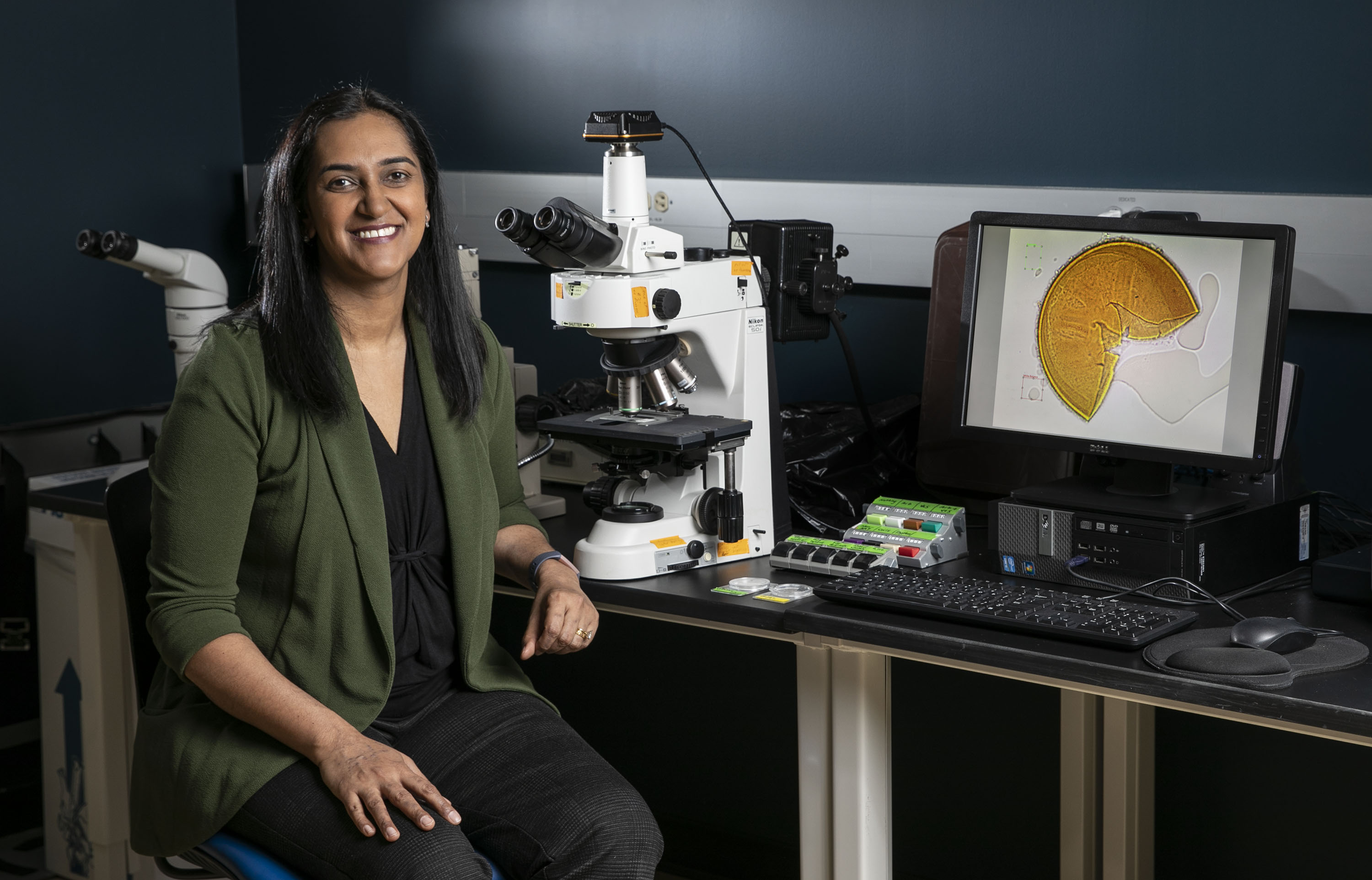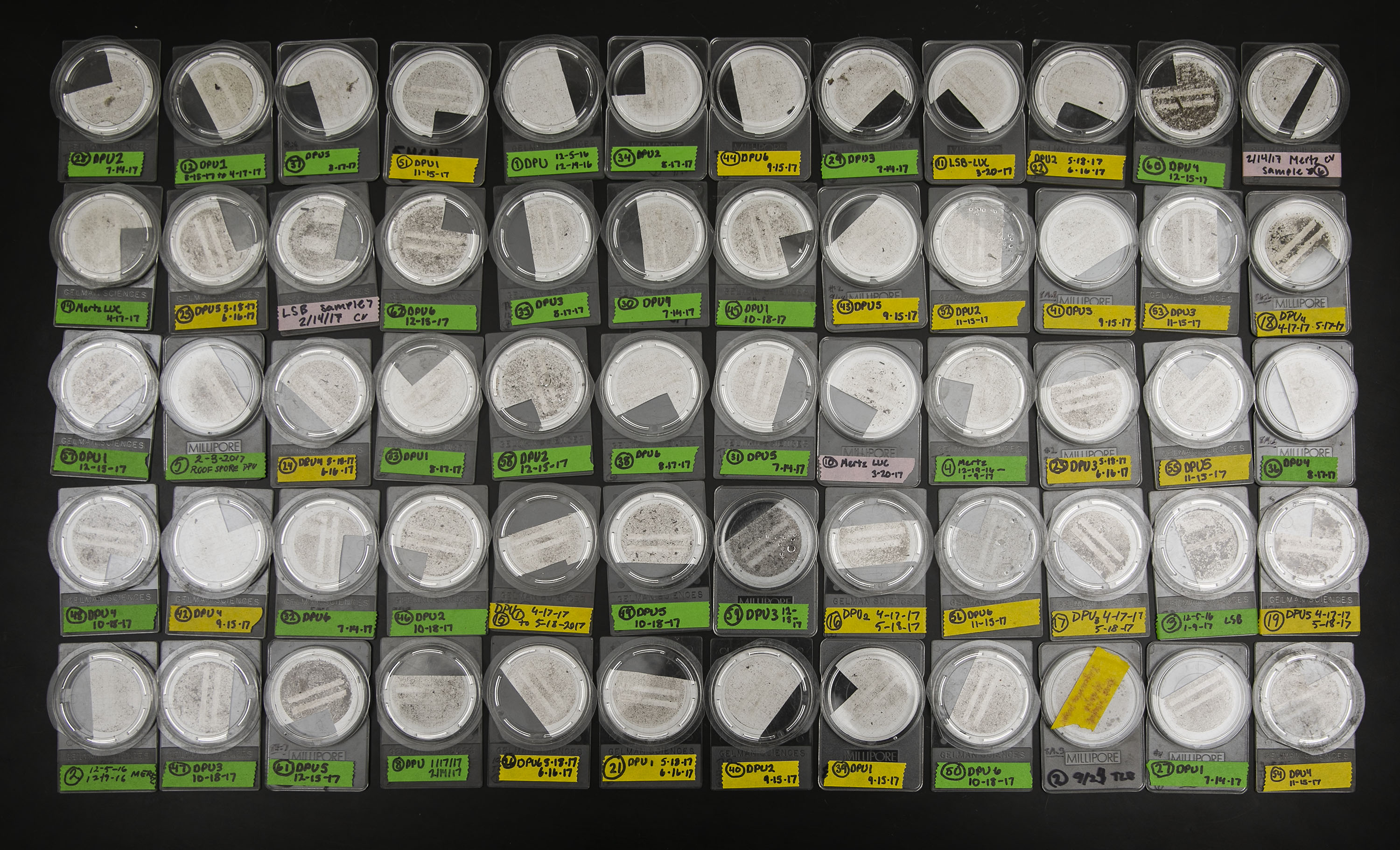 The research of Bala Chaudhary, an assistant professor in the Department of Environmental Science and Studies at DePaul University, examines soil ecological questions, with a focus on mycorrhizal fungi. In her lab in the College of Science and Health, Chaudhary compares traits of soil fungi under a microscope in an effort to address a variety of different environmental challenges such as biodiversity conservation, sustainable agriculture and climate change. (DePaul University/Jamie Moncrief)
The research of Bala Chaudhary, an assistant professor in the Department of Environmental Science and Studies at DePaul University, examines soil ecological questions, with a focus on mycorrhizal fungi. In her lab in the College of Science and Health, Chaudhary compares traits of soil fungi under a microscope in an effort to address a variety of different environmental challenges such as biodiversity conservation, sustainable agriculture and climate change. (DePaul University/Jamie Moncrief)Assistant professor of environmental science Bala Chaudhary is embarking on a deep dive into mycorrhizal dispersal mechanisms with support from the National Science Foundation.
Chaudhary is a recent recipient of a Faculty Early Career Development grant, NSF’s most prestigious award in support of early-career faculty who have the potential to serve as academic role models in research and education and to lead advances in the mission of their department or organization. The $715,000, five-year research grant will support a multifaceted project that combines trait-based ecology, macroecology and physical laws to study dispersal of mycorrhizal fungi.
Mycorrhizal fungi are among the most common beneficial fungi for plants, mining soil nutrients and delivering them to plants in exchange for sugars, explains Chaudhary.
All plants on Earth, from farm crops to fruit trees, delicate herbs to vegetables in backyard gardens, prairie grasses and exotic flowers, need a little help from these often overlooked partners in order to survive and thrive. However, the impact they have on plants depends on the type of fungal species present, notes Chaudhary, whose research focuses on the ecology of mycorrhizas, the common symbiotic associations between plants and fungi.
“The microbial communities that associate with plants can have large implications for agriculture, forestry and ecosystems. We know environmental factors and dispersal determine microbial community structure, but little is known about how microbes disperse long distances,” Chaudhary says. “For nearly 100 years, the ‘everything is everywhere’ hypothesis has dominated microbial ecology, suggesting microbial dispersal is unlimited and community assembly mechanisms are primarily deterministic. However, certain fungi vary with respect to traits that could impact their long-distance dispersal capabilities. Coupling knowledge of traits with physical laws that govern movement could provide a powerful framework to predict dispersal, a key component of biogeography.”
Educational component
A CAREER grant differs from typical NSF grants in that there is a large educational component, notes Chaudhary. One of the educational objectives of this project is the development of an ecological data analysis course using open-access National Ecological Observatory Network (NEON) data and data collected in this study. Students in the course will be able to proficiently manage large datasets, conduct and interpret complex statistical tests used in ecology, and conduct original data analysis projects using real data.
 Dust samples containing spores lined up in Bala Chaudhary’s mycorrhizal ecology lab. Chaudhary, an assistant professor in the Department of Environmental Science and Studies at DePaul University, is using spore traits to track long-distance aerial dispersal of microbes. (DePaul University/Jamie Moncrief)
Dust samples containing spores lined up in Bala Chaudhary’s mycorrhizal ecology lab. Chaudhary, an assistant professor in the Department of Environmental Science and Studies at DePaul University, is using spore traits to track long-distance aerial dispersal of microbes. (DePaul University/Jamie Moncrief)Another educational objective will involve Chicago-area high school and DePaul University students in “schoolyard science.” The high school students, mentored by DePaul undergraduate and graduate students, will learn how to install dust collectors and collect and analyze urban ecological data. A public project website will be created to distribute video protocols, map sites and share data, Chaudhary says.
A third educational objective stems from Chaudhary’s passion to improve systems to increase participation in ecology and the environmental sciences by underrepresented minority students. “Students of color often approach me with concerns of feeling isolated in our field and wanted to know what we could do about it,” Chaudhary says. Through student interviews, Chaudhary will research barriers for undergraduate minority students studying ecology and inform best practices for recruitment and retention.
Early career commitment
Chaudhary has been teaching courses in plant biology, environment data analysis and climate change at DePaul since 2016 as an assistant professor in the College of Science and Health. In her
mycorrhizal ecology lab in the Department of Environmental Science and Studies, Chaudhary examines soil ecological questions, with a focus on mycorrhizal fungi, something she has been studying since her own undergraduate days at the University of Chicago, where she earned a bachelor’s degree in biological sciences.
Mycorrhizal fungi also was the topic of her doctoral dissertation and her master’s thesis. Both her doctorate and master’s degree in biological sciences were earned at Northern Arizona University.
Other current DePaul faculty who have received NSF CAREER awards include Quinetta Shelby, associate professor and chair of chemistry, and James Riely, professor in the School of Computing.